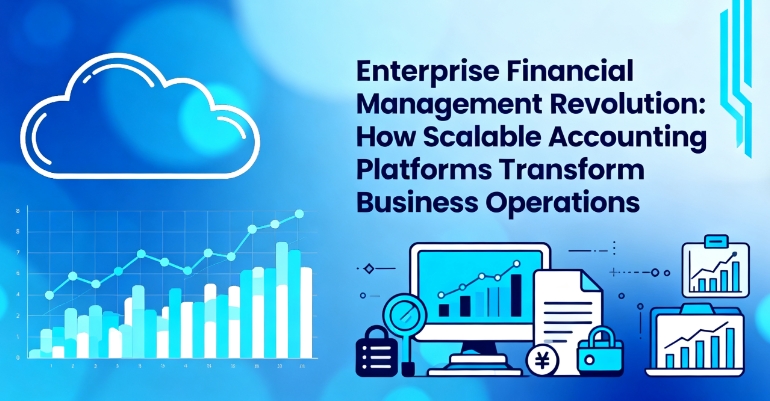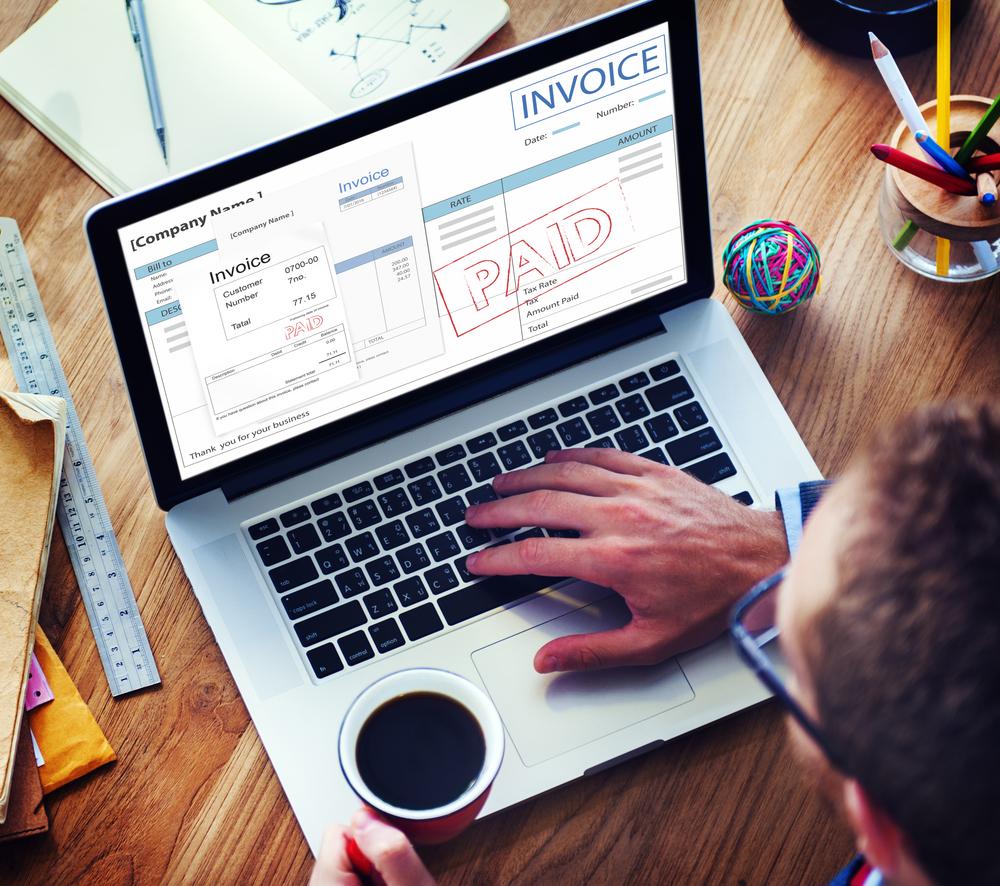Enterprise Financial Management Revolution: How Scalable Accounting Platforms Transform Business Operations
Explore how modern accounting platforms revolutionize business financial management through intelligent automation, real-time data analytics, and seamless system integration. This comprehensive examination reveals how scalable solutions transform enterprise accounting by reducing manual processes, enhancing accuracy, and providing actionable financial insights. Discover the role of artificial intelligence in predicting cash flow, identifying anomalies, and automating complex tasks while understanding how flexible pricing structures make professional financial management accessible to organizations of all sizes within today's dynamic business environment.

In today's dynamic business landscape, robust financial management systems have become indispensable for organizational success. Modern accounting platforms deliver scalable solutions that fundamentally reshape how enterprises oversee their financial operations, driving efficiency and strategic decision-making across all business dimensions.
Intelligent Automation: Reinventing Financial Administration
Contemporary financial platforms revolutionize accounting through sophisticated automation capabilities that transform traditional record-keeping processes. This technological evolution delivers substantial time savings while enhancing accuracy and enabling organizations to redirect resources toward strategic initiatives. By implementing advanced accounting solutions, businesses achieve unprecedented levels of operational efficiency and productivity enhancement.
Streamlining Repetitive Financial Operations
Modern platforms eliminate the burden of manual financial tasks through comprehensive automation systems. These solutions handle everything from bank reconciliation and transaction verification to compliance deadline management, transforming what were previously time-intensive processes into streamlined automated operations. This transition from manual data entry to automated processing significantly reduces error rates while ensuring financial records maintain constant accuracy and current status.
The efficiency gains extend across multiple financial functions including automated invoice generation, payment reminder systems, and comprehensive expense tracking. By automating these essential processes, businesses achieve more efficient financial management while freeing valuable personnel resources for core business activities that drive growth and innovation.
Live Financial Intelligence and Analytics
Advanced automation features enable real-time financial analysis through integrated data consolidation from multiple sources. This provides businesses with a holistic view of their financial health, facilitating data-driven decisions based on current information rather than historical reports. The immediate visibility into financial performance allows organizations to rapidly identify trends, monitor key performance indicators, and track cash flow movements.
This real-time analytical capability empowers proactive financial management and strategic adjustments. Businesses can quickly identify payment pattern issues with clients and implement improved collection strategies, or analyze expenditure trends to pinpoint cost reduction opportunities. The transformative power of instant financial intelligence represents a fundamental shift from reactive to proactive financial management.
Artificial Intelligence in Financial Operations
The integration of artificial intelligence into accounting software represents the next evolutionary stage in financial process enhancement. AI-driven automation manages complex functions including cash flow prediction, anomaly detection in transactions, and personalized financial insights. While some organizations continue developing their AI readiness, forward-thinking enterprises already anticipate substantial productivity improvements through AI-powered accounting automation.
AI systems analyze historical financial data to generate accurate revenue and expense forecasts, supporting superior budgeting decisions. These intelligent systems also identify unusual patterns in financial data that may indicate discrepancies or potential issues, enabling preventive measures before problems escalate. As artificial intelligence technology continues advancing, its role in automating and simplifying financial operations will expand significantly.
Real-Time Data Utilization: Transforming Financial Oversight
In contemporary business environments, access to real-time financial information has transitioned from competitive advantage to operational necessity. The capacity to monitor financial performance as it occurs provides significant strategic benefits regardless of organizational size. Modern financial platforms revolutionize oversight through comprehensive real-time data integration and analysis.
The Advantage of Immediate Financial Insights
Real-time financial data transforms business management by providing instant visibility into cash flow status, profitability drivers, and potential operational issues before they develop into significant problems. Unlike traditional accounting approaches that rely on historical information, real-time data offers forward-looking perspective based on current financial conditions. This capability proves particularly valuable in rapidly changing market environments where conditions evolve constantly.
Cloud-based accounting solutions enable financial data access from any location at any time, promoting enhanced collaboration and informed decision-making across the organization. The shift from periodic reporting to continuous financial monitoring represents a fundamental transformation in how businesses manage their financial operations and strategic direction.
Optimizing Financial Workflows
Beyond providing current financial status overviews, real-time data significantly enhances operational efficiency across financial processes. Traditional reconciliation tasks, previously time-consuming and error-prone, become largely automated through real-time data integration. This automation liberates financial teams to concentrate on strategic initiatives while improving payment processing speed, reporting accuracy, and regulatory compliance.
The consolidation of multiple financial data sources into a unified platform delivers comprehensive business financial health visibility, enabling improved forecasting and strategic planning. This integrated approach creates more efficient and effective financial operations that contribute substantially to overall business stability and growth trajectory.
AI-Enhanced Financial Analytics
Artificial intelligence integration amplifies the power of real-time data through advanced analytical capabilities. AI algorithms process extensive financial datasets to identify trends, anomalies, and opportunities that might otherwise remain undetected. These capabilities help businesses optimize pricing strategies, enhance cash flow management, and identify potential fraudulent activities.
Additionally, AI automates routine tasks including data entry and invoice processing, further increasing efficiency for financial professionals. The global adoption of AI in daily business operations continues accelerating, with particularly strong growth within online accounting platforms that leverage these technologies for enhanced functionality and user experience.
Financial Sustainability Through Advanced Oversight
The concept of sustainability extends beyond environmental considerations to encompass long-term financial health. Real-time data plays a crucial role in establishing sustainable financial practices by providing transparency and enabling proactive management. This capability helps businesses avoid financial difficulties while building resilient financial foundations.
In complex regulatory environments, real-time data facilitates rapid adaptation to changing requirements while supporting robust verification processes and enhanced transparency. The integration of digital tools strengthens strategic financial oversight within evolving regulatory frameworks, ensuring compliance while maintaining operational flexibility.
Cost-Effective Solutions for Diverse Business Requirements
Financial management platforms address budget considerations through flexible pricing structures designed to accommodate various business sizes and financial capabilities. Modern solutions provide accessible options that deliver substantial value without compromising functionality or performance.
Understanding Online Accounting Investment
The transition to online accounting solutions generates significant cost benefits through automation, reduced manual labor requirements, and enhanced operational efficiency. Initial software and training investments typically yield long-term returns through improved productivity and accuracy. Businesses should evaluate comprehensive savings potential when assessing different accounting platform options.
Most platforms offer tiered service levels with functionality scaling according to business growth stages. This approach ensures organizations pay only for required features, avoiding unnecessary expenses for capabilities not yet needed while maintaining flexibility for future expansion.
Affordable Solutions for Growing Businesses
Modern platforms provide specifically designed solutions for small and medium enterprises that include essential features like invoicing, expense tracking, reconciliation, and basic reporting. The affordability of these packages enables smaller organizations to access professional accounting tools without excessive financial commitment.
These solutions prove particularly valuable for businesses seeking financing, as platforms incorporating AI streamline accounting and financial management processes. The seamless data integration and real-time financial insights facilitate improved decision-making without requiring extensive dedicated financial teams, making sophisticated financial management accessible to organizations of all sizes.
Seamless System Integration: Connecting Essential Business Tools
Modern accounting solutions transform business operations through effortless connectivity with other essential business applications. This integration eliminates manual data transfer, reduces errors, and creates streamlined financial management ecosystems that enhance overall business efficiency.
The Value of Connected Systems
In competitive business environments, operational efficiency determines success. Manual data transfer between different platforms consumes valuable time while increasing error potential. Seamless integration eliminates these challenges by enabling direct connections between accounting software and other critical business tools including e-commerce platforms and payment processing systems.
Sales information from online stores automatically flows into accounting systems, eliminating manual reconciliation requirements. Similarly, payments processed through digital payment platforms instantaneously record in financial systems, providing real-time cash flow visibility. This integration not only saves time but enhances data accuracy, leading to improved financial insights and strategic decisions.
Consolidating all financial information within a unified platform delivers comprehensive business performance overviews. This enables rapid trend identification, key metric tracking, and informed decisions regarding pricing, inventory, and other critical business aspects. Essentially, streamlined integration enables smarter work practices, allowing focus on business growth rather than administrative tasks.
Common Inquiries Regarding Enterprise Accounting Solutions
What primary advantages do comprehensive accounting platforms offer enterprises?
Advanced accounting solutions provide complete financial management systems that automate routine accounting functions, significantly enhancing efficiency while reducing error potential. Their cloud-based architecture ensures real-time data accessibility, enabling swift informed decision-making. Additionally, these platforms deliver scalable solutions that accommodate evolving business requirements, such as increased transaction volumes or advanced feature integration including payroll and inventory management. This scalability proves particularly valuable for expanding enterprises seeking to grow operations without replacing their financial systems.
How do online accounting platforms improve financial management for small and medium businesses?
Modern online accounting solutions empower growing businesses through comprehensive tools that streamline bookkeeping and accounting processes. Cloud-based platforms enable business owners to access financial information from any location at any time, promoting improved decision-making and collaboration. The software integrates seamlessly with various business applications, reducing manual data entry requirements and minimizing errors. Furthermore, these platforms offer cost-effective pricing options tailored to different business sizes, ensuring organizations can leverage professional accounting tools without substantial financial investment.
Can accounting platforms assist with regulatory compliance requirements?
Yes, contemporary accounting platforms help businesses maintain compliance with regulatory standards through features that facilitate accurate record-keeping and reporting. These systems support various compliance frameworks by automating tax calculations and generating necessary documentation, reducing administrative burdens. This automation ensures financial records remain current and audit-ready, helping businesses avoid potential penalties associated with non-compliance while adapting to changing regulatory environments.
What role does artificial intelligence play in enhancing accounting platform functionality?
Artificial intelligence in accounting platforms enhances functionality by automating complex tasks and delivering advanced financial insights. AI capabilities include cash flow trend prediction, unusual transaction identification that may indicate irregularities, and personalized financial recommendations based on historical data. For businesses, these features translate to improved financial forecasting accuracy and proactive financial risk management. As AI technology continues evolving, its integration into accounting platforms will likely deliver increasingly sophisticated tools for enhancing business productivity and strategic decision-making.
How do accounting platform pricing structures accommodate diverse business needs?
Modern accounting platforms provide flexible pricing models designed to serve various business requirements, from individual entrepreneurs to large corporations. These systems offer multiple service tiers, each featuring specific capabilities suited to different business sizes and complexity levels. Basic plans serve independent professionals with straightforward accounting needs, while advanced options deliver comprehensive tools for larger organizations with complex requirements. This tiered pricing approach ensures companies pay only for necessary features, making professional accounting solutions financially accessible for businesses at any development stage.
References:
https://www.xero.com/au/accounting-software/
https://quickbooks.intuit.com/au/accounting-software/
https://arielle.com.au/best-accounting-software-for-small-business/








